
UPDATED ON APRIL 24, 2020 — Today, President Trump signed off on an additional $320 billion in coronavirus relief for small businesses seeking relief through the Paycheck Protection Program (PPP). This additional cash infusion adds to the earlier $349 billion of PPP funding that ran out as of April 16, 2020. The information below generally describes the application procedure for applying for relief through an SBA-approved lender. The SBA, in consultation with the Department of the Treasury, provides additional guidance for lenders and borrowers at https://home.treasury.gov/system/files/136/Paycheck-Protection-Program-Frequently-Asked-Questions.pdf. This article will be updated on a regular basis.
Under the “Coronavirus Aid, Relief, and Economic Security Act” (CARES Act), small businesses, sole proprietors, independent contractors, and self-employed persons can apply for loans under the PPP through approved SBA lenders. If borrowers have an existing relationship with an SBA-approved bank, that will likely be the best path to a speedy loan funding given the heavy volume of applications.
The PPP can potentially provide forgivable loans to cover 2.5 months of average monthly payroll costs or $10 million, whichever is less. Seventy-five percent of the loan proceeds must be used for payroll costs. While payroll costs for salary/wages are capped at $100,000 annually, the SBA has stated that this cap does not apply to other payroll costs, such as health benefits, retirement benefits (e.g., 401k contributions), and state unemployment taxes. Payroll costs are calculated on a gross basis and are not reduced by federal income or employee payroll taxes. Payroll costs do not include payments businesses make to independent contractors.
Up to 100% of the principal loan amount can be forgiven. The maximum forgiveness amount will be the equivalent of what a business spends on forgivable expenses in the eight weeks after the loan is funded. Forgivable expenses include payroll costs, mortgage interest, rent, and utilities. The maximum forgiveness amount will be reduced based on formulas provided in the CARES Act if businesses reduce full-time employee levels and/or reduce employee compensation beyond certain thresholds. Reductions in staffing and compensation levels that are restored by June 30, 2020, will not count towards the forgiveness reduction formulas.
A business may be eligible for a PPP loan if it has 500 or fewer employees whose principal place of residence is in the United States. A business with over 500 employees may be eligible if it meets the SBA employee-based or revenue-based size standard corresponding to its primary industry. For industry size standards, visit the SBA website. PPP loans are also available for qualifying tax-exempt nonprofit 501(c)(3) organizations, tax-exempt 501(c)(19) veterans organizations, and Tribal business concerns described in section 31(b)(2)(C) of the Small Business Act that have 500 or fewer employees whose principal place of residence is in the United States.
The information provided herein is intended as general information and is not to be construed as legal advice. If legal advice is needed, you should consult an attorney.
Benjamin J. Larson is a litigation attorney who focuses on complex commercial and regulatory matters and advises his business clients on a wide range of corporate and regulatory matters, including best practices for business formation and governance to avoid litigation from internal and external disputes. He can be reached at 303-628-3685 or blarson@irelandstapleton.com.
Lidiana Rios is a commercial litigator at Ireland Stapleton. She represents small, mid-size, and large public and private companies, as well as individuals, in state and federal trials, appeals, mediations, and arbitrations. Ms. Rios handles a wide range of complex commercial litigation matters, including corporate governance and contract disputes, misappropriation of trade secrets, unfair competition, business fraud, and fraudulent transfers. She can be reached at (303) 628-3607 or lrios@irelandstapleton.com.